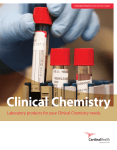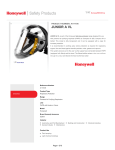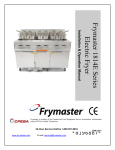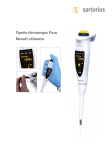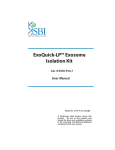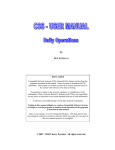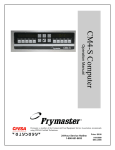Download Proline®Plus pipette
Transcript
Proline ® Plus pipette User Manual Bedienungsanleitung Mode d'emploi Manual Usuario Instruzioni d'impiego Инструкция пользователя Proline® Plus pipette User Manual................................................................1 Bedienungsanleitung............................................ 15 Mode d'emploi........................................................ 31 Manual Usuario....................................................... 47 Instruzioni d'impiego............................................ 63 Инструкция пользователя........................... 79 Specifications.......................................................... 97 Huom! Suomenkielinen käyttöohje ladattavissa osoitteesta: www.sartorius.com Obs: Manual på svenska kan du ladda ner på adressen www.sartorius.com Contents 1. Intended use...................................................................................................... 2 2. Product description......................................................................................... 2 3. Sartorius pipette tips...................................................................................... 3 4.Unpacking........................................................................................................... 4 5. Pipette holder and carousel stand............................................................. 4 6. Calibration tool ............................................................................................... 4 7. Operating the pipette..................................................................................... 4 7.1. Setting the volume........................................................................... 4 7.2. Sealing and ejecting tips................................................................ 5 7.3. Protective tip cone filters.............................................................. 5 8. Pipetting techniques...................................................................................... 5 8.1. Forward pipetting............................................................................. 6 8.2. Reverse pipetting ............................................................................. 6 8.3. Repetitive reverse technique........................................................ 6 9. Recommendations for good pipetting..................................................... 7 10.Maintenance...................................................................................................... 7 10.1. Daily cleaning of the outer surface of the pipette.............. 8 10.2. Cleaning and the lower part of the pipette............................ 8 10.3. Sterilization of the pipette............................................................ 9 11. Testing the performance and recalibration.........................................10 11.1. Testing the performance..............................................................10 11.2.Recalibration....................................................................................12 12. Trouble shooting.............................................................................................13 13. Warranty information..................................................................................14 14. Performance specifications.......................................................................14 1 1. Intended use Proline®Plus pipette is intended to be used in liquid handling applications for dispensing liquids in total volume range from 0,1 µl to 10 ml. It is recommended to use Optifit tips or SafetySpace™ Filter tips to ensure the best compatibility and performance with Sartorius pipettes. This liquid handling device is designed and manufactured to be used as general purpose laboratory equipment. Before operating it is recommended to read the user manual, which contains useful information e.g. for good pipetting practice. 2. Product description Your new Proline® Plus is an autoclavable air displacement pipette. The attractive and ergonomical design of the Proline® Plus pipette together with its low pipetting forces reduce the risk of repetitive strain injuries (RSI). The pipette is designed for both right- and left-handed use. NOTE: It is known that prolonged pipetting can cause RSI. The manufacturer is not responsible for RSI or any related diseases caused by prolonged pipetting. The special tip cone design of the pipette offers the possibility to use replaceable Safe-Cone Filters to help prevent the contamination and damage of the pipette. The pipette uses disposable tips. Proline®Plus single- and multichannel pipettes Cat. No. Colour Code Channels Volume Range/µl Safe-Cone Filters Increment Tip /µl /µl Standard Plus 728010 Grey 1 0.1-3 0.002 10 - - 728020 Grey 1 0.5-10 0.01 10 - - 728030 Yellow 1 2-20 0.02 200 721014 - 728040 Yellow 1 5-50 0.1 200 721008 721018 728050 Yellow 1 10-100 0.1 200, 350 721008 721018 728060 Yellow 1 20-200 0.2 200, 350 721007 721017 728070 Blue 1 100-1000 1 1000 721006 721016 728080 Green 1 500-5000 10 5000 721005 721015 728090 Red 1 1-10 ml 20 10 000 721005 721015 728515 Grey 1 5 10 - - 2 728520 Grey 1 10 10 - - 728530 Yellow 1 20 200 721014 - 728535 Yellow 1 25 200 721008 721018 728545 Yellow 1 50 200 721008 721018 728550 Yellow 1 100 200, 350 721008 721018 728560 Yellow 1 200 200, 350 721007 721017 728565 Blue 1 250 1000 721006 721016 728567 Blue 1 500 1000 721006 721016 728570 Blue 1 1000 1000 721006 721016 728575 Green 1 2000 5000 721005 721015 728580 Green 1 5000 5000 721005 721015 728590 Red 1 10 ml 10 000 721005 721015 728120 Grey 8 0.5-10 0.01 10 - - 728130 Yellow 8 10-100 0.1 200, 350 721008 721018 728140 Orange 8 30-300 0.2 350 721007 721017 728220 Grey 12 0.5-10 0.01 10 - - 728230 Yellow 12 10-100 0.1 200, 350 721008 721018 728240 Orange 12 30-300 0.2 350 721007 721017 3. Sartorius pipette tips Sartorius pipette tips are recommended for use with Proline®Plus pipettes. The use of fully compatible tips will ensure the maximal pipetting accuracy and precision, and thereby guarantee the performance specifications given for the pipette. Sartorius tips are made of pure virgin polypropylene and manufactured in protected clean room conditions. Sartorius offers a full range of standard Optifit, and SafetySpace™ Filter tips. Sartorius nonfilter tips are available in trays, bulk packages and space-saving refill systems. Sartorius nonfiltered tips and trays are autoclavable at 121°C (252F), 20 min, 1 bar (15 p.s.i.). All Single Tray Racks and clean Refill Packs are certified RNase, DNase and endotoxin-free. For more information, please go to www. sartorius.com or contact your local Sartorius support. 3 4.Unpacking The Proline®Plus pipette package contains the following items: 1. Pipette 2. Tip 3. Calibration tool (also tube opener) 4. Safe-Cone filters (pipettes >10 µl and forceps) 5. Grease 6. Instruction manual 7. Performance certification in accordance with ISO 8655-6 Please check that all items are included and that no damage has occurred during shipment. 5. Pipette holder and carousel stand For convenience and safety, always keep the pipette vertically on its own holder, carousel or linear stand when not in use. Cat.No. Product 725600 Carousel Stand for 6 pipettes 725610 Pipette Holder for 1 pipette 725620 Linear Stand 6. Calibration tool (also tube opener) The calibration tool is designed for the following purposes: 1. Tool for recalibration (A). 2. Opening tool for the lid of the calibration nut (B). 3. Opening tool for the tubes (C). 7. Operating the pipette 7.1. Setting the volume The volume of the pipette is clearly shown through the display. The volume setting is carried out with the following steps: 4 B C A – + 1. Set the volume by rotating the operating button (clockwise to decrease the volume and counterclockwise to increase). NOTE: Do not rotate the operating button outside the volume range of the pipette. 7.2. Sealing and ejecting tips To ensure the maximum accuracy and precision, Sartorius tips are recommended to be used with Proline®Plus pipettes. Before fitting a tip ensure that the pipette tip cone is clean. Press the tip on the tip cone of the pipette. Tip ejector Eject the tip by pressing the tip ejector with your thumb. Make sure that the tip is disposed into a suitable waste container. 7.3. Protective tip cone filters The tip cone design of the Sartorius pipettes (>10 µl) allows the use of Safe-Cone Filters in the tip cones. These removable filters prevent liquids and aerosols from entering the pipette and thus, protects the pipette from contamination and damage. The Safe-Cone Filters are available as Standard or Plus versions. It is recommended to use the Standard filter for general applications and the Plus filter for more demanding applications such as cell culture, bacterial and virological work and molecular biology. Filters need to be exchanged regularly. The interval for filter exchanging is application dependant but the recommendation is to change the filter daily (after 50 - 250 pipetting cycles) and always in case of over-aspiration. (See Chapter 2 for ordering information.) The Filter Foreceps should be used to avoid touching the soiled filters by hand. See Chapter 2 for ordering information. Make sure that the filter is disposed into a suitable waste container. Clean the tip cone if needed and put the new filter in place. 8. Pipetting techniques Two basic pipetting techniques, forward and reverse pipetting, are associated with Proline®Plus pipettes. Forward pipetting is the most common used pipetting technique. The technique employs 5 the blow-out function ensuring complete delivery of the liquid. Reverse pipetting is recommended for highly viscous, biological or foaming liquids, or very small volumes of liquid. A selected volume plus an excess is aspirated into the tip. The delivery is done without blow-out, and, thus, the excess volume remains in the tip. The reverse technique also facilitates the repeated delivery of the same volume. If reverse pipetting technique is used the pipette might need recalibration. 8.1. Forward pipetting 1. Fit the tip onto the pipette tip cone. 2. Press the operating button to the first stop. 3. Place the tip just under the surface of the liquid (2-3 mm) and smoothly release the operating button up to the starting position. Wait one second. Carefully withdraw the tip from the liquid, touching against the edge of the container to remove excess from the outside of the tip. 4. Dispense the liquid by pressing the operating button to the first stop. After a short delay press the operating button to the second stop. This action will empty the tip. 0 1 2 8.2. Reverse pipetting 1. Fit the tip onto the pipette tip cone. 2. Press the operating button all the way to the second stop. 3. Place the tip just under the surface of the liquid (2-3 mm) and smoothly release the operating button up to the starting position. 4. Withdraw the tip from the liquid touching against the edge of the container to remove excess. 5. Press the operating button smoothly to the first stop to deliver the desired volume. Hold the operating button at the first stop. The liquid that remains in the tip should not be included in the delivery. 6. Discard the remaining liquid by pressing the operating button to the second stop. 8.3. Repetitive reverse technique 1. Follow the reverse technique steps 1 to 5. 2. Continue pipetting by repeating steps 3 to 5 as long as needed. 3. Finally discard the remaining liquid by 6 0 1 2 pressing the operating button to the second stop. 9. Recommendations for good pipetting - Make sure that the tip is firmly attached to the tip cone. - Hold the pipette vertically when aspirating the liquid and place the tip only a few millimeters into the liquid. - Always control the operating button slowly and smoothly. - Pre-rinse the tip before aspirating the liquid by filling and emptying the tip for three to five times. This is important especially when pipetting liquids with a viscosity and density greater than water or liquids with high vapor pressure (e.g. ethanol). - Check that the pipette, tip and liquid are at the same temperature. - When pipetting liquids with temperatures different to the ambient temperature change the tip after each pipetting. Do not pre-rinse the tip. - To avoid contamination, do not rest the pipette on its side especially with the tip attached. - Change the tip cone filter regularly (recommendation after 50 - 250 pipetting cycles). - Never strike the tip cone against the tip tray when mounting the tip as this can damage the pipette. - Avoid rough handling and do not drop the pipette. - Avoid exposing the unit to extreme temperature changes, humidity and dust (operating temperature from 15°C to 40°C). 10.Maintenance Proline®Plus pipettes have been designed for easy in-house service. If the pipette is used daily it is recommended to clean/decontaminate and check the performance of the pipette every three months. Sartorius also provides complete repair and recalibration service for your pipette including a service report and performance certificate. 7 NOTE: Please make sure that the pipette has been decontaminated before you send it to us or your local representative. Please advise if any hazardous material has been used with your pipette. NOTE: The use of the tip cone filters may prolong the service interval. Change the filters regularly. NOTE: It is recommended to always use gloves when cleaning the pipette. 10.1. Daily cleaning of the outer surface of the pipette Your Proline®Plus pipette should be checked every day for cleanliness. To clean and decontaminate the outer surface of your pipette use ethanol (70%), isopropanol (60%) or a mild detergent and a soft lint-free cloth. Gently clean the surface of the pipette with moistened cloth and wipe dry. Pay special attention to the tip cone. Change the tip cone filter if needed (Chapter 7.3.) 10.2. Cleaning and the lower part of the pipette If your pipette is in daily use it is recommended to clean/decontaminate and grease the pipette every three months. It is recommended to send the multichannel pipettes to your local Sartorius service representative for cleaning and greasing. To clean and decontaminate the lower parts of the single channel pipette, follow these steps: Disassembling and cleaning (see the pictures under the cover page): 1. Eject the tip cone filter (if fitted, Chapter 7.3.) 2. Unscrew the tip ejector collar (1) counterclockwise and remove it. 3. Pipettes < 2000 µl: Unscrew the tip cone holder (2) counterclockwise and carefully remove it with the tip cone (3). Pipettes 2000, 5000, 10 ml: Unscrew the tip cone cylinder (3) counterclockwise and remove it. 4. Clean the tip ejector collar, the tip cone holder, the tip cone (cylinder) and the piston (4) with ethanol (70%), isopropanol (60%) or 8 mild detergent and soft lint-free cloth. 5. Clean the interior of the tip ejector collar and the tip cone (cylinder) with a cotton swab. Be careful with the pipettes so that the seal inside the tip cone will not damage. 6. Rinse the parts with distilled water if needed and let the parts dry. 7. Pipettes ≤ 100 µl: Put a thin layer of grease on the piston (4). Pipettes 250, 500 and 1000 µl: Put a thin layer of grease around the piston seal (4). Pipettes 2000, 5000 and 10 ml: Put a thin layer of grease on the piston seal (4) and the interior of the tip cone cylinder (3). NOTE: Avoid excess grease. Use only the grease provided with the pipette. NOTE: Before reassembling check that no lint or particles are on the surface of the piston. Reassembling: 1.Pipettes: Carefully place the tip cone (3) on the piston and attach it by screwing the tip cone holder (2) clockwise. Pipettes 2000, 5000 and 10 ml: Carefully place the tip cone cylinder (3) on the piston and screw clockwise. Make sure that the tip cone (cylinder) is properly tightened. Avoid over-tightening. 2. Attach the tip ejector collar (1) by screwing it clockwise. 3. Place the new tip cone filter on its place. 4. Press the operating button several times to ensure that the grease has spread evenly. 5. Check the performance of the pipette. Connecting collar 360° NOTE: It is always necessary to check the performance of the pipette after in-house service or maintenance. 10.3. Sterilization of the pipette The entire Proline®Plus pipette can be sterilized by steam autoclaving at 121°C, (252°F), 1 atm for 20 minutes. Remove the tip cone filter (if fitted, Chapter 7.3). The single channel pipettes can be autoclaved without special preparations. Unscrew the lower part of the multichannel pipettes by holding the connecting collar and turning the 9 lower part 360° counterclockwise. Put the pipette into the sterilization bag and place it into the autoclave. After autoclaving, the pipette must be cooled down and left to dry overnight before use. Screw the lower part of the multichannel pipettes by holding the connecting collar and turning the lower part 360° clockwise. Make sure that the lower part is properly tightened. It is recommended to check the performance of the pipette after every autoclaving. It is also recommended to grease the piston/seal of the pipette after every 10 autoclaving. 11. Testing the performance and recalibration It is recommended to check the performance of your Proline®Plus pipettes regularly (e.g. every 3 months) and always after in-house maintenance. However, the user should establish a regular testing routine for their pipettes with regard to accuracy requirements of the application, frequency of use, number of operators using the pipette, nature of the liquid dispensed and the acceptable maximum permissible errors established by the user. (ISO 8655-1.) 11.1. Testing the performance Performance testing should take place in a draught-free room at 15 - 30°C, constant to +/- 0.5°C and humidity above 50%. The pipette, tips and the test water should have stood in the test room a sufficient time (at least 2 hours) to reach equilibrium with the room conditions. Use distilled or deionised water (grade 3, ISO 3696). Use an analytical balance with a readability of 0.01 mgs. (ISO 8655-6.) Weighing 1. Adjust the desired test volume Vs . 2. Carefully fit the tip onto the tip cone. 3. Fill the tip with test water and expel to waste five times to reach a humidity equilibrium in the dead air volume. 4. Replace the tip. Pre-wet the tip by filling it once with test water and expel to waste. 5. Aspirate the test water, immersing the tip only 2-3 mm below the surface of the water. Keep the pipette vertical. 10 6. Withdraw the pipette vertically and touch the tip against the inside wall of the test water container. 7. Pipette the water into the weighing vessel, touching the tip against the inside wall of the vessel just above the liquid surface at an angle of 30° to 45°. Withdraw the pipette by drawing the tip 8-10 mm along the inner wall of the weighing vessel. 8. Read the weight in mgs (mi). 9. Repeat the test cycle until 10 measurements have been recorded. 10. Convert the recorded masses (mi) to volumes (Vi) Vi = mi Z Z = correction factor (Table 1) 11. Calculate the mean volume (⊽) delivered: ⊽ = (∑Vi)/10 12.For conformity evaluation calculate the systematic error es of the measurement: in µl: es= ⊽ - Vs Vs = selected test volume or in %: es = 100 (⊽ - Vs)/Vs 13.For conformity evaluation calculate the random error of the measurement: as standard deviation s = ∑(Vi - ⊽)2 n - 1 n = number of measurement (10) or as coefficient of variation CV = 100s/⊽ 14. Compare the systematic error (inaccuracy) and random error (imprecision) with the values in the performance specifications - (p. 97) or the specifications of your own laboratory. If the results fall within the specifications, the pipette is ready for use. Otherwise check both systematic and random errors and, when necessary, proceed to the recalibration procedure (Chapter 11.2). NOTE: Systemic error (inaccuracy) is the difference between the dispensed volume and the selected test volume. Random error (imprecision) is the scatter of the dispensed volumes around the mean of the dispensed volume. (ISO 8655-1.) NOTE: Sartorius specifications are achieved in strictly controlled conditions (ISO 8655-6). The user should establish own specifications based on the field of use and the accuracy requirements placed on the pipette (ISO8655-1). 11 Table 1 Z-values (µl/mg): Temp. (°C) Air Pressure (kPa) 95 100 101.3 105 20.0 1.0028 1.0028 1.0029 1.0029 20.5 1.0029 1.0029 1.0030 1.0030 21.0 1.0030 1.0031 1.0031 1.0031 21.5 1.0031 1.0032 1.0032 1.0032 22.0 1.0032 1.0033 1.0033 1.0033 22.5 1.0033 1.0034 1.0034 1.0034 23.0 1.0034 1.0035 1.0035 1.0036 23.5 1.0036 1.0036 1.0036 1.0037 NOTE: This method is based on ISO 8655. 11.2.Recalibration The calibration of your Proline®Plus pipette has been factory-checked by using forward pipetting technique and certified at 22°C using grade 3 distilled water according to ISO 3696. The calibration is based on ISO 8655-6: Gravimetric test method for volumetric instruments. The pipette's specifications are guaranteed only with genuine Sartorius tips. If you find the pipette to be inaccurate after performance testing, please follow the instructions below: 1. Remove the lid of the calibration nut, located on the back of the handle, with the aid of the calibration tool. 2. Place the hexagonal head of the calibration tool into the hole of the calibration nut. 3. Turn the adjustment lock counterclockwise to decrease and clockwise to increase the volume. 4. Repeat testing the performance procedure (Chapter 11.1.). Continue until the results are correct. NOTE: Recalibration is recommended if reverse pipetting technique is used. NOTE: Sartorius offers accredited calibration service. Please contact your local Sartorius representative for further information. 12 12. Trouble shooting Symptom Possible cause Solution Droplets left inside the tip Unsuitable tip Use original Sartorius tips Leakage or pipetted Non uniform wetting volume too small of the plastic Pipette out of established specifications Operating button jammed or moves erratically Tip ejector jammed or moves erratically Attach new tip Tip incorrectly attached Attach firmly Unsuitable tip Use original Sartorius tips Foreign particles between tip and cone Clean the tip cone, attach new tip Tip cone holder incorrectly tightened Tighten the tip cone holder Pipette damaged Return to your Sartorius service representative for servicing Incorrect operation Follow instructions Unsuitable tip Use original Sartorius tips Calibration altered Reclibrate Liquid has penetrated tip cone and dried Clean and grease the piston/seal Clean the tip cone Safe-Cone Filter has been contaminated Change filter Insufficient amount of grease on a piston and seal Grease accordingly Tip ejector collar has been contaminated Remove and clean ejector collar and tip cone 13 13. Warranty information The Proline®Plus pipettes are covered by warranty for 2 years against defects in materials and workmanship. Should your pipette fail to function at any time, please contact your local Sartorius representative. ANY WARRANTY WILL, HOWEVER, BE DEEMED AS VOID IF FAULT IS FOUND TO HAVE BEEN CAUSED BY MALTREATMENT, MISUSE, UNAUTHORIZED MAINTENANCE OF SERVICE OR NEGLIGENCE OF REGULAR MAINTENANCE AND SERVICE, ACCIDENTAL DAMAGE, INCORRECT STORAGE OR USE OF THE PRODUCTS FOR OPERATIONS OUTSIDE THEIR SPECIFIED LIMITATIONS, OUTSIDE THEIR SPECIFICATIONS, CONTRARY TO THE INSTRUCTIONS GIVEN IN THIS MANUAL OR WITH OTHER THAN THE MANUFACTURER’S ORIGINAL TIPS. Each Proline®Plus pipette is tested before shipping by the manufacturer. The Sartorius Quality Assurance Procedure guarantees that the Proline®Plus pipette you have purchased is ready for use. 14.Performance specifications The manufacturer's specifications (p. 97) are guaranteed only when the manufacturer's original tips are used. The manufacturer's specifications should be used as guidelines when establishing your own performance specifications in accordance with ISO 8655. 14 Specifications Proline ® Plus single-, 8- and 12-channel pipettes Cat. No Channels Volume Range µl Test Volume/ Inacc. µl (%) Impr. (%) 728010 1 0.1-3 3 1.5 0.3 1.30 2.40 10.0 0.80 1.60 6.00 728020 1 0.5-10 10 5 1 1.00 1.50 2.50 0.60 1.00 1.50 728030 1 2-20 20 10 2 0.90 1.20 3.00 0.40 1.00 2.00 728040 1 5-50 50 25 5 1.00 1.40 3.00 0.30 0.50 1.50 728050 1 10-100 100 50 10 0.80 1.00 2.00 0.15 0.40 1.00 728060 1 20-200 200 100 20 0.60 0.80 2.00 0.15 0.30 0.80 728070 1 100-1000 1000 500 100 0.60 0.60 1.00 0.20 0.20 0.40 728080 1 500-5000 5000 2500 500 0.50 0.60 2.00 0.20 0.30 0.60 728090 1 1-10 ml 10 000 5000 1000 0.60 1.20 3.00 0.20 0.30 0.60 728515 728520 728530 728535 728545 728550 728560 728565 728567 728570 728575 728580 728590 1 1 1 1 1 1 1 1 1 1 1 1 1 5 10 20 25 50 100 200 250 500 1000 2000 5000 10 ml 5 10 20 25 50 100 200 250 500 1000 2000 5000 10 000 1.30 0.80 0.60 0.50 0.50 0.50 0.40 0.40 0.30 0.30 0.30 0.30 0.60 1.20 1.80 0.50 0.30 0.30 0.30 0.20 0.20 0.20 0.20 0.15 0.15 0.20 728120 8 0.5-10 10 5 1 1.50 2.50 4.00 1.00 2.50 4.00 728130 8 10-100 100 50 10 0.70 1.00 3.00 0.25 0.70 1.50 728140 8 30-300 300 150 30 0.60 1.00 2.00 0.25 0.50 1.00 728220 12 0.5-10 10 5 1 1.50 2.50 4.00 1.00 2.50 4.00 728230 12 10-100 100 50 10 0.70 1.00 3.00 0.25 0.70 1.50 728240 12 30-300 300 150 30 0.60 1.00 2.00 0.25 0.50 1.00 Sartorius Biohit Liquid Handling Oy Laippatie 1 FI-00880 Helsinki Finland Phone +358.755.951 [email protected] www.sartorius.com Headquarter Sartorius Corporate Administration GmbH Weender Landstrasse 94-108 37075 Goettingen, Germany Phone +49.551.308.0 Fax +49.551.308.3289 www.sartorius.com All rights reserved. No part of this publication may be reprinted or translated in any form or by any means without the prior written permission of Sartorius. The status of the information, specifications and illustrations in this manual is indicated by the date given aside. Sartorius reserves the right to make changes to the technology, features, specifications and design of the equipment without notice. All trademarks are Sartorius property unless otherwise stated. Patents granted or pending. 4002250 • 03/2013 • © Sartorius Biohit Liquid Handling Oy Copyright by Sartorius, Helsinki, Finland.


























